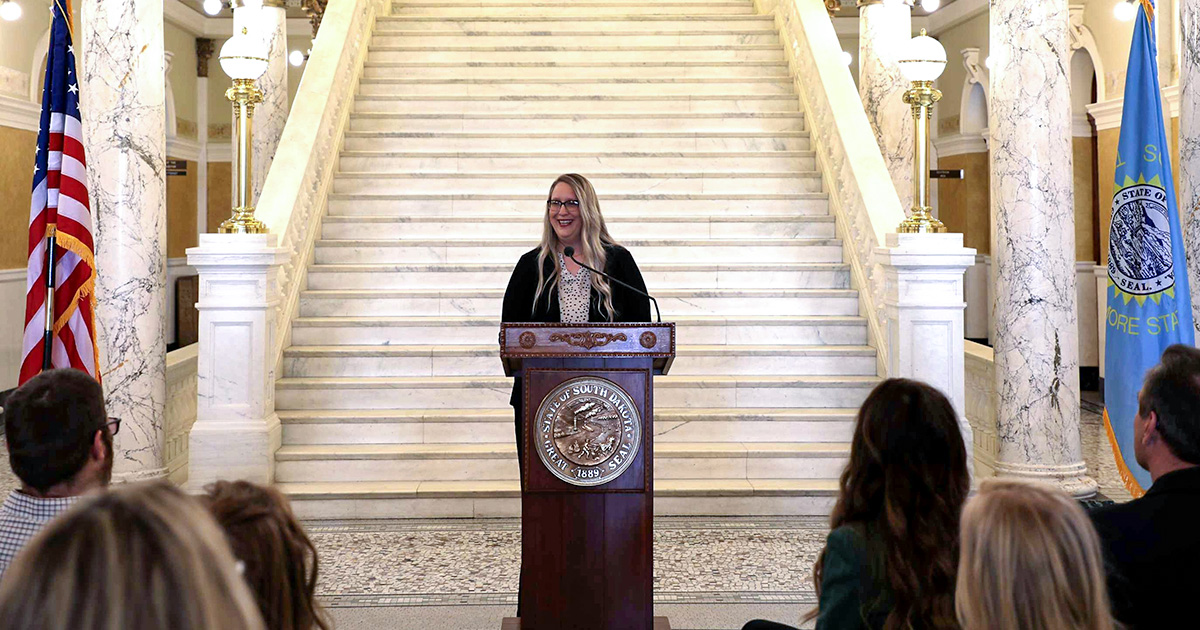Leaders from South Dakota gathered in the Capitol Rotunda in Pierre on May 21 to celebrate Kandy Flowers, the first graduate of the South Dakota Teacher Apprenticeship Pathway (SD TAP). Attendees included Governor Kristi Noem, South Dakota Secretary of Education Dr. Joseph Graves, Secretary of Labor and Regulation Marcia Hultman, legislative members of the Joint Appropriations Committee, representatives from the Board of Regents, leaders from Ms. Flowers' school, and Dr. David De Jong, dean of the College of Education and Human Performance at Dakota State University, all prominent figures in South Dakota who have supported the program's development and implementation.
This fall, Ms. Flowers will begin her role as a preschool and junior kindergarten teacher in the Wessington Springs School District, where she previously worked as a paraprofessional before participating in SD TAP.
Launched as a pilot in summer 2023, SD TAP is tackling South Dakota's growing teacher shortage by offering paraprofessionals a chance to earn their bachelor's degree online, with most costs covered, all while continuing to work in South Dakota schools. The program's creators see these paraprofessionals as a key resource for developing the next generation of South Dakota teachers. With their deep ties to the state's schools, students, and communities, these future teachers are expected to stay in the profession longer than those who come from outside the state or enter through more traditional pathways.
Ms. Flowers joined 87 other apprentices in the pilot cohort, with the option to enroll at Dakota State University for elementary or special education certification or Northern State University for secondary education. To complete the program within the two-year funding period, most apprentices take a full courseload of 12 or more credits per semester, including summers, while continuing to work full-time as paraprofessionals. Many of them, like Ms. Flowers, brought in previously earned college credits, shortening their path to completion. Apprentices must meet the same rigorous standards as traditional teacher candidates, including earning the required credits and passing state certification exams.
Throughout the program, apprentices receive personalized guidance from experienced teachers in their school or district. To show appreciation for the support these mentor teachers provide to apprentices, mentors earn a stipend from their district and additional financial recognition from the Department of Labor and Regulation once they fulfill their mentoring duties. Apprentices also benefit from the support of a university-based mentor and advisor, who help them navigate course registration and create a plan to complete the program within two years.
To build on the success of the pilot program, the South Dakota legislature has authorized $800,000 in funding to launch a second cohort of SD TAP. Interest in the program remains high, with nearly 300 paraprofessionals applying for the first cohort and close to 250 for the second. This fall, 90 new apprentices will embark on their journey toward teaching certification.
REL Central is collaborating closely with our partners to gather valuable insights that enhance the experiences of both apprentices and mentors in the SD TAP program, including supporting our partners to collect formative data to improve the apprentices' and mentors' experiences. Our partners hope that telling the story of the apprenticeship will build buy in and, ideally, help them secure continuing funding to keep it running. Early data indicate positive outcomes, with apprentices showing a strong commitment to teaching in South Dakota. For example, administrative data from Dakota State University reveal that 94 percent of the first cohort remains enrolled, and 95 percent of those are on track to graduate within six semesters. In the spring 2024 apprentice satisfaction survey, 100 percent of respondents expressed that they are likely or very likely to stay in South Dakota for their entire teaching career, and 97 percent would recommend SD TAP to a friend.
By focusing on gathering feedback from users, partners are able to better understand the actual experiences of paraprofessionals and their mentors, not just the intended experience as designed. These insights are driving improvements in the support provided to both groups. For instance, when the fall 2023 primary mentor survey revealed that only about half of the mentors had prior mentoring experience, partners responded by enhancing resources and training to boost mentors' capacity and confidence. Additionally, after feedback from the fall 2023 apprentice satisfaction survey indicated that some course content felt repetitive with their classroom work, Dakota State University updated the curriculum to allow teacher candidates to take their Praxis exams earlier, enabling them to test out of certain content courses by demonstrating mastery. Responding to a spring 2024 apprentice survey request for mentorship from peers or previous apprentices, SD TAP is now offering opportunities for cross-cohort, small-group sessions with university-based mentors, bringing together apprentices from both the first and second cohorts.
This work represents South Dakota's deep commitment to strengthening their existing human capital by creating opportunities for working South Dakotans to develop skills and improve their lives. In the coming year, partners will begin using South Dakota's Statewide Longitudinal Data System to track where apprenticeship graduates work and their retention rates over time. REL Central will continue to support partners in collecting data from participants to monitor implementation and make improvements to support apprentices and mentors and in thinking long-term about the data and outcomes they want to report over time. The longer-term goal of our work together is for South Dakota to see a return on this investment in their local workforce through a decrease in vacant teaching positions.
This post first appeared on the REL Central blog.



